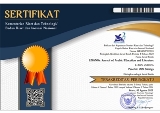The Arabic Language of Resistance to Polygamy on Social Media: Study on Hastag Ta’addud al-Zaujat
Abstract
Keywords
Full Text:
PDFReferences
Ahmed, Hamoud, and Ruzy Hashim. 2015. “Greening of Resistance in Arabic Poetry: An Ecocritical Interpretation of Selected Arabic Poems.” 3L: The Southeast Asian Journal of English Language Studies 21:13–22. doi: 10.17576/3L-2015-2101-02.
Ahmed, Leila. 2021. Women and Gender in Islam. Yale University Press.
Al-Rawi, Ahmed. 2016. “Anti-ISIS Humor: Cultural Resistance of Radical Ideology.” Politics, Religion & Ideology 17(1):52–68. doi: 10.1080/21567689.2016.1157076.
Diponegoro, Ahmad Muhammad. 2014. “Polygamous Marriages in Java Indonesia and Marriage Law: The Social Psychological Perspective.” in International Conference on Law, Management and Humanities (ICLMH’14) June 21-22, 2014 Bangkok (Thailand). International Centre of Economics, Humanities and Management.
Dissa, Yaya. 2016. “Polygamy in Mali: Social and Economic Implications on Families.” 10.
Djonov, Emilia, and Theo Van Leeuwen. 2017. The Power of Semiotic Software: A Critical Multimodal Perspective. The Routledge handbook of critical discourse studies. Routledge.
Hamdy, Basma. 2017. “The Arabic Language as Creative Resistance.” Pp. 155–75 in Street Art of Resistance, edited by S. H. Awad and B. Wagoner. Cham: Springer International Publishing.
Harlow, Summer. 2012. “Social Media and Social Movements: Facebook and an Online Guatemalan Justice Movement That Moved Offline.” New Media & Society 14(2):225–43. doi: 10.1177/1461444811410408.
Haslam, S. Alexander, and Stephen D. Reicher. 2012. “When Prisoners Take Over the Prison: A Social Psychology of Resistance.” Personality and Social Psychology Review 16(2):154–79. doi: 10.1177/1088868311419864.
Havas, Clemens, Bernd Resch, Chiara Francalanci, Barbara Pernici, Gabriele Scalia, Jose Fernandez-Marquez, Tim Van Achte, Gunter Zeug, Maria Mondardini, Domenico Grandoni, Birgit Kirsch, Milan Kalas, Valerio Lorini, and Stefan Rüping. 2017. “E2mC: Improving Emergency Management Service Practice through Social Media and Crowdsourcing Analysis in Near Real Time.” Sensors 17(12):2766. doi: 10.3390/s17122766.
Heilig, Leah Louise. 2015. “Signal Boost!: Hashtags as Performative Writing and Social Action.” 82.
Husain, Irfan Rahmad, and Rahmat Sewa Suraya. 2017. “"Resistensi Pedagang Kaki Lima Terhadap Razia Satpol PP Di Pasar Sentral Kota Lama Kendari.” ETNOREFLIKA: Jurnal Sosial Dan Budaya 6(3):237–48.
Martí, Ignasi, and Pablo Fernández. 2013. “The Institutional Work of Oppression and Resistance: Learning from the Holocaust.” Organization Studies 34(8):1195–1223. doi: 10.1177/0170840613492078.
Medina, José. 2012. The Epistemology of Resistance: Gender and Racial Oppression, Epistemic Injustice, and Resistant Imaginations. Oxford University Press.
Medina, José. 2017. Varieties of Hermeneutical Injustice 1. The Routledge handbook of epistemic injustice. Routledge.
Mirecki, Rachel M., Andrew S. Brimhall, and Kosha D. Bramesfeld. 2013. “Communication During Conflict: Differences Between Individuals in First and Second Marriages.” Journal of Divorce & Remarriage 54(3):197–213. doi: 10.1080/10502556.2013.773798.
Muhammad Agami Hassan Muhammad. 2017. “Arabic Performance Poetry: A New Mode of Resistance.” Arab Studies Quarterly 39(2). doi: 10.13169/arabstudquar.39.2.0815.
Mulyadi, Urip, and Lisa Fitriana. 2018. “Hashtag (#) as Message Identity in Virtual Community.” Jurnal The Messenger 10:44. doi: 10.26623/themessenger.v10i1.671.
Musthofa,. 2022. “الأزهر وتعدد الزوجات: جريدته الرسمية ترد على تصريحات أحمد كريمة وسط غضب عبر مواقع التواصل.” BBC News Arab. Retrieved October 3, 2022.
Ngom, Fallou. 2002. “Linguistic Resistance in the Murid Speech Community in Senegal.” Journal of Multilingual and Multicultural Development 23(3):214–26. doi: 10.1080/01434630208666466.
Sager, Tore. 2016. “Activist Planning: A Response to the Woes of Neo-Liberalism?” European Planning Studies 24(7):1262–80. doi: 10.1080/09654313.2016.1168784.
Siddi, Ibnu Radwan, and T. MA. 2017. “The Provisions of Polygamy in the Family Law of Islamic Countries (Saudi Arabia, Turkey, Tunisia, Malaysia and Indonesia).” Al-Usrah: Jurnal al Ahwal as Syakhsiyah 5(1):13–26.
Steinert-Threlkeld, Zachary C., Delia Mocanu, Alessandro Vespignani, and James Fowler. 2015. “Online Social Networks and Offline Protest.” EPJ Data Science 4(1):19. doi: 10.1140/epjds/s13688-015-0056-y.
Stoknes, Per. 2015. What We Think About When We Try Not To Think About Global Warming.
Syamsuddin, Sukring. 2018. “A Legal Debate on Polygamy: Classical and Contemporary Perspectives.” ESENSIA: Jurnal Ilmu-Ilmu Ushuluddin 19(2):147–60.
Tailassane, Roumaissaa. 2019. “Women’s Rights and Representation in Saudi Arabia, Iran, and Turkey: The Patriarchal Domination of Religious Interpretations.” International Relations Honors Papers (5).
van Vliet, Livia, Petter Törnberg, and Justus Uitermark. 2020. “The Twitter Parliamentarian Database: Analyzing Twitter Politics across 26 Countries.” PLOS ONE 15(9):e0237073. doi: 10.1371/journal.pone.0237073.
Wardeh, Nadia. 2016. “RETHINKING POLYGAMY IN ISLAMIC EXEGETICAL DISCOURSE.” International Journal of Arts and Scinces 9:413–26.
DOI: https://doi.org/10.18326/lisania.v7i1.46-61
Refbacks
- There are currently no refbacks.
Copyright (c) 2023 Rika Astari, Abdul Mukhlis, Muhammad Irfan Faturrahman

This work is licensed under a Creative Commons Attribution-ShareAlike 4.0 International License.
View My Stats







